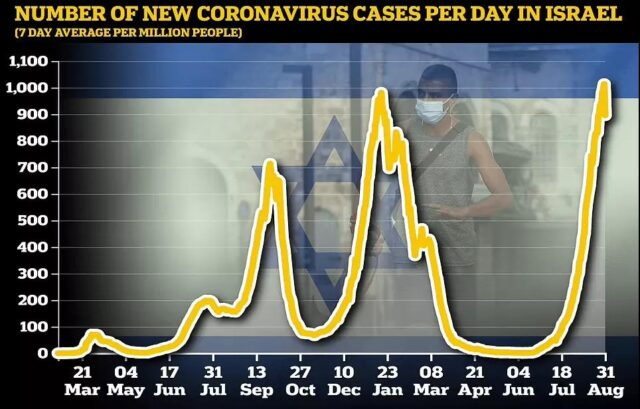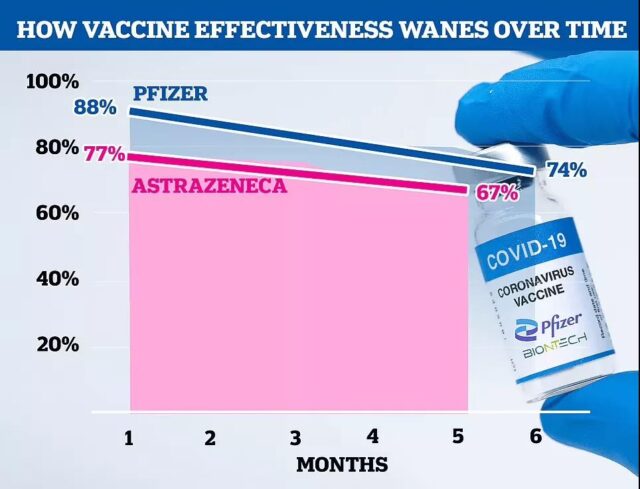Why is Israel still out of control on COVID-19 even with 78% vaccination?
- Normal Liver Cells Found to Promote Cancer Metastasis to the Liver
- Nearly 80% Complete Remission: Breakthrough in ADC Anti-Tumor Treatment
- Vaccination Against Common Diseases May Prevent Dementia!
- New Alzheimer’s Disease (AD) Diagnosis and Staging Criteria
- Breakthrough in Alzheimer’s Disease: New Nasal Spray Halts Cognitive Decline by Targeting Toxic Protein
- Can the Tap Water at the Paris Olympics be Drunk Directly?
Why is Israel still out of control on COVID-19 even with 78% vaccination?
- Should China be held legally responsible for the US’s $18 trillion COVID losses?
- CT Radiation Exposure Linked to Blood Cancer in Children and Adolescents
- FDA has mandated a top-level black box warning for all marketed CAR-T therapies
- Can people with high blood pressure eat peanuts?
- What is the difference between dopamine and dobutamine?
- How long can the patient live after heart stent surgery?
Why is Israel still out of control on COVID-19 even with 78% vaccination?
Israel, with a vaccination rate of 78%, why is the epidemic still out of control? Is there a need to worry about the effectiveness of the COVID-19 vaccine? Is it necessary to strengthen the injection?
On September 23, researchers discussed in “The BMJ” about “exaggerating the weakening of vaccine immunity” and whether it is necessary to strengthen the injection.
Israel has a 78% COVID-19 vaccination rate, but it didn’t take long for it to become one of the countries with the highest infection rate in the world, making people worry and suspect that in the face of the highly contagious Delta variant, the vaccine’s immunity has also begun to become fragile.
Before the long-term effects of enhanced needles in reducing infection, transmission, and hospitalization are unclear, reliable clinical data is needed to prove whether it is necessary.
High-income countries especially exaggerate the decline in vaccine immunity, which will only affect confidence in vaccination, increase the inequality of vaccine distribution, prolong the pandemic and its devastating public health and socioeconomic impact, and increase the risk of new variants.
Therefore, rapid expansion of global vaccination coverage should be the most urgent public health priority.
Israel is one of the countries with the highest rate of COVID-19 vaccination in the world. 78% of the population over 12 years old are vaccinated, mainly Pfizer mRNA vaccine. On June 15, Israeli officials announced: All people take off masks! It didn’t take long for Israel to become one of the countries with the highest infection rate in the world.
Only 6 days after announcing “removal of masks”, the number of confirmed cases in Israel has surged. Over 90% of the confirmed cases are all infected with the Delta variant. One-half of those infected have already been vaccinated against the COVID-19 vaccine.
This wave of outbreaks in Israel was caused by the Delta mutant, with a daily increase of up to 6000 cases. The protection gained from the vaccine becomes fragile in the face of the highly contagious Delta variant, which makes people full of doubts and worries about the effectiveness of the vaccine.
 Daily infection data in Israel
Daily infection data in Israel
On September 23, researchers published an article “COVID-19-19 vaccination: evidence of waning immunity is overstated” in “The BMJ”, discussing about “exaggerating the weakened immunity of vaccines” and whether it is necessary to strengthen the injection.
 doi: https://doi.org/10.1136/bmj.n2320
doi: https://doi.org/10.1136/bmj.n2320
In high-income countries with advanced vaccine programs, the resurgence of the new coronavirus epidemic has raised concerns about the durability of vaccine effectiveness, especially for the more contagious Delta mutation. This has led some people to advocate increasing the dose for the general population before there is clear evidence that the third booster dose of the COVID-19 vaccine is beneficial. We believe this is misguided.
 The protection rate of the vaccine was significantly reduced within a few months
The protection rate of the vaccine was significantly reduced within a few months
The initial randomized trial showed that the vaccine has a high efficacy against the symptomatic new coronavirus.
Observational studies continue to evaluate and report the true performance of the vaccine in different environments and time.
In addition to providing direct protection against the new coronavirus disease, existing vaccines also drastically reduce transmission by preventing symptomatic and asymptomatic infections.
Although there are concerns about the immune escape potential of the Delta variant, studies consistently show that the vaccine can provide a high level of protection against symptoms and serious diseases and deaths caused by the variant.
With this in mind, systematic sampling studies seem to show that over time, the ability to protect against infection has diminished. However, the main goal of the new coronavirus vaccine is to prevent serious diseases, not infections. Multiple well-designed studies have found that vaccines against severe new coronaviruses have sustained effectiveness for most adults.
A large UK study published in the form of a preprint used a case-control design based on PCR results. The results showed that five months after vaccination, especially in people without serious underlying diseases, the risk of serious diseases is high. Horizontal protection continues.
On the other hand, the estimated reductions in vaccine-prevented infections vary widely and are more difficult to explain. These cross-research and national dynamic estimates are severely affected by prevalence, behavior, and cyclic variation, and comparing them does not reliably determine the changes in immune protection over time.
For example, a study from Israel found that after vaccination, the relative infection rate increased over time, because the time of vaccination is not random, and factors such as the risk of exposure to the new coronavirus and the tendency to seek testing have confused the vaccine. Any correlation between the time after vaccination and infection, so there are some potential deviations.
Similarly, although infections among health care workers in San Diego, California increased from June to July, these changes can be explained by an increase in community prevalence rather than a sudden decrease in immunity. Another study in the United States also proposed the impact of behavioral changes on the effectiveness of vaccines.
The study found that the effectiveness of only people under the age of 65 declined over time. These examples show the basic challenges of using routine surveillance data to assess the effectiveness of anti-infection, and emphasize the need for systematic sampling, considering the comprehensive range of measured and unmeasured confounding factors, and careful interpretation.
Long-term immune response
From an immunological point of view, the plasma neutralizing antibody titer is expected to eventually decline after vaccination, but after mRNA vaccination, it shows a strong and long-lived plasmablast and B cell response. Memory B cells have been proven Increase in at least six months, improve function, and provide cross-mutation protection.
Plasma neutralizing antibody titers can predict a certain degree of protection against symptomatic infections. However, the understanding of the strength of this relationship over a longer period of time is still limited.
In view of the reported differences in sustained effectiveness against serious diseases and infections, neutralizing antibodies are unlikely to be the only protective mechanism; cellular immunity is more important in long-term protection against serious diseases.
Most importantly, the long-term effects of intensified injections in reducing infection, transmission, and hospitalization are unclear. Although booster needles increase plasma antibody levels and may temporarily prolong antibody-mediated protection, they have not been proven to enhance memory B cell and T cell responses, thereby providing long-term protection against serious diseases for most people with normal immune functions.
In an observational study in Israel, the benefits associated with the third dose of Pfizer’s biotechnology vaccine (BNT162b2) were reported. For severe diseases, the follow-up period for the intensive group was only 7 people a day, and for infections, the follow-up period was only one day. 12 people, the time is too short to evaluate the long-term efficacy.
Any potential benefits of additional doses, especially for symptomatic and severe diseases, should be evaluated based on long-term data, preferably from randomized controlled trials.
For those who may not be able to adequately respond to the initial vaccination due to immunosuppression or advanced age, increasing the vaccine dose is reasonable, but exaggerating the evidence of reduced immunity in the general population has had important consequences, including affecting vaccine confidence .
In addition, the concern about the decline in immunity in high-income countries has diverted people’s urgent need for primary vaccination and the limited supply of vaccines for people who lack immunity (especially low- and middle-income countries). This will exacerbate unacceptable vaccine inequality, prolong the pandemic and its devastating public health and socio-economic impact, and increase the risk of new variants.
The first large-scale wave in the vaccine era shows that even in countries with high coverage, more transmissible variants are capable of challenging the control of the new coronavirus. At present, this is a greater threat than a decline in immunity.
Proving that antibody levels in the general population can be increased should not be regarded as evidence of long-term effectiveness, and reliable clinical data is needed to assess the need for additional doses.
The risks of not being vaccinated are obvious and far outweigh the unknown benefits of revaccinating the general population.
The rapid expansion of global vaccination coverage remains the most urgent public health priority.
Reference:
1.https://www.bmj.com/content/374/bmj.n2320
Why is Israel still out of control on COVID-19 even with 78% vaccination?
(source:internet, reference only)
Disclaimer of medicaltrend.org
Important Note: The information provided is for informational purposes only and should not be considered as medical advice.



